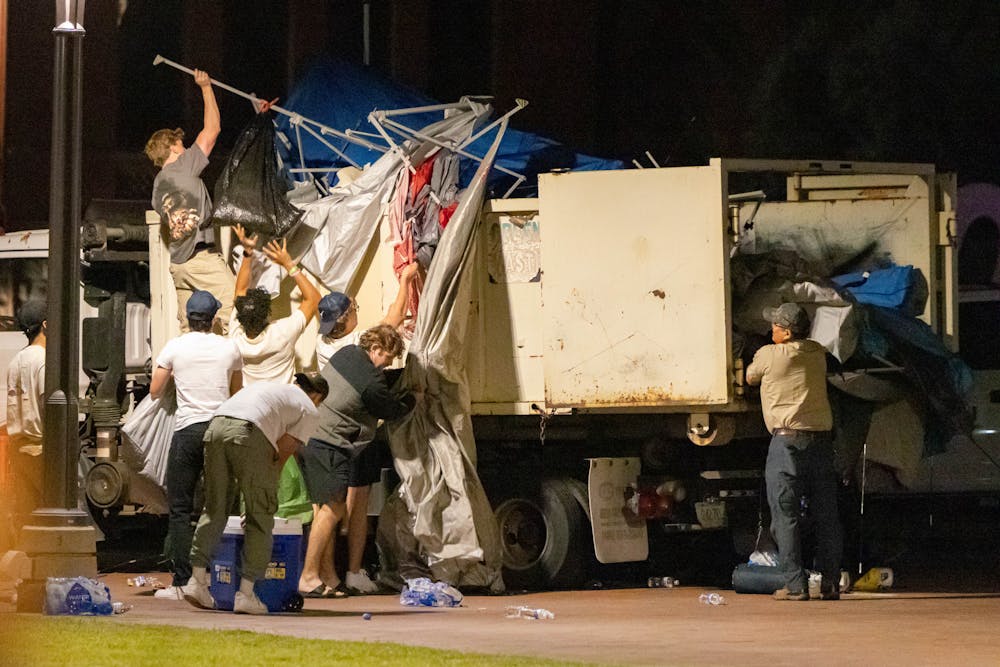Arizona Gov. Katie Hobbs signed a bill on May 7 banning encampments on the state's university and community college campuses.
House Bill 2880 deems individuals who "establish or occupy an encampment" on campuses to be guilty of criminal trespass and liable for costs related to removing the encampment and repairing any damage caused. According to state law, this degree of criminal trespass is a class 3 misdemeanor, punishable by up to 30 days in prison.
Encampments are defined by the bill as "a temporary shelter, including tents, that is installed on the campus of a university or community college and that is used to stay on the campus overnight or for a prolonged period of time."
Under the new law, university and community college administrators must direct encampment occupants to immediately dismantle the encampment and vacate the campus at risk of being charged with criminal trespass.
Individuals who do not comply with the direction to leave will be subject to legal action removing them from the campus, including being reported to law enforcement. Disciplinary action will also be taken by the institution of higher education per the student code of conduct.
In April 2024, students and others formed a pro-Palestine encampment on the ASU Tempe campus. 72 people were arrested, including 20 students placed on interim suspension.
READ MORE: Protesters arrested at ASU encampment arrive for arraignment, ASU PD fails to submit charges
Democratic Rep. Alma Hernandez of District 20 sponsored the legislation. In a meeting with the House Education Committee, she said the bill would give university and community college administrators the authority needed to dismantle encampments.
Hernandez also teaches healthcare policy and innovation at ASU and graduated in May with a juris doctor of law degree.
"I want to make one thing very clear," Hernandez said in the committee meeting. "There is no legal right or authority to camp on university property."
Hernandez said the bill reinforces existing language from the Arizona Board of Regents Student Code of Conduct.
The Student Code of Conduct prohibits "Unauthorized presence in or unauthorized use of university property, resources, or facilities."
Neither Hernandez nor the governor’s office responded to requests for comment. Students for Justice in Palestine at ASU also did not respond to request for comment.
The bill had bipartisan support and opposition. Five Republican legislators voted against it, although the bill passed 41-17 in the state House and 18-10 in the state Senate.
Several state Republican legislators did not respond to requests for comment.
Democratic Rep. Kevin Volk of District 17 said the bill helps ensure campus safety while maintaining students’ First Amendment rights.
"Encampments have been used to take over parts of the campus so they are no longer usable by all students, and that’s a problem," Volk said.
Volk said encampments are not covered by the First Amendment because they are physical structures, saying assembly and free expression can occur without encampments. He listed numerous alternatives, including rallies, marches and social media campaigns.
Julian Bernhardt, the communications director for the Arizona Students’ Association and a recent graduate from Northern Arizona University, said the legislation "demonized students" and called it "vastly un-American." Democratic Rep. Cesar Aguilar of District 26 also said the legislation goes against "what this country has been founded on."
Bernhardt said Hobbs’s signature of the bill would turn voters against her and that the move was based in political pressure.
"Looking back in 10 years, she’s going to be on the wrong side of history," Aguilar said.
As a participant in the April 2024 NAU encampment, Bernhardt said that while it is important to recognize a rise in antisemitism, it did not stem from encampments at ASU, UA and NAU.
They said while at the encampment, they did experience offensive language from opponents.
"I actually remember being told by counterprotesters how I deserved to die, how I deserved to be blown up," Bernhardt said.
Bernhardt did not expect the bill to stop student speech, while Aguilar said college students have become scared to speak up.
They both said that it will be damaging to students’ rights.
"Bills like HB2880 are rooted in fear," Bernhardt said. "They’re rooted in paranoia, and they undermine the very importance of free speech."
Edited by George Headley, Leah Mesquita and Katrina Michalak.
Reach the reporter at coyer1@asu.edu and follow @carstenoyer on X.
Like The State Press on Facebook and follow @statepress on X.
Carsten Oyer is a sophomore studying journalism and mass communication, as well as public service and public policy. This is his second semester with The State Press, having previously worked as a politics reporter.




